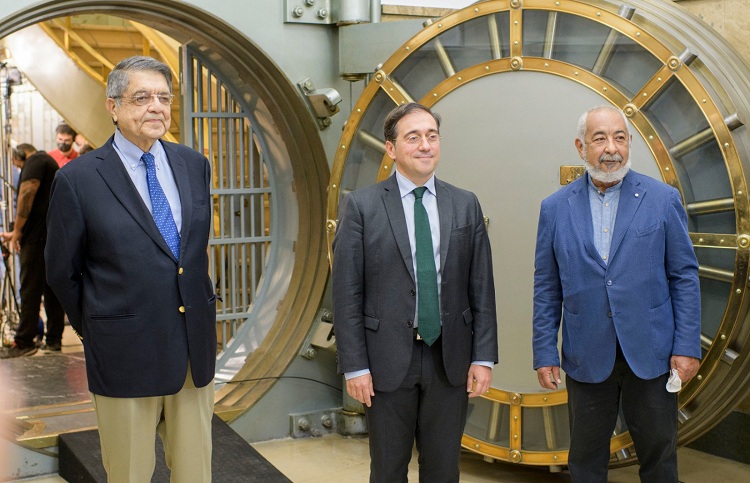The Diplomat
The accusations and the arrest warrant against Sergio Ramírez presided yesterday over the ceremony for the presentation of the Legacy of Rubén Darío in the Caja de las Letras of the Instituto Cervantes, in which the Minister of Foreign Affairs, José Manuel Albares, showed Spain’s support for the Nicaraguan writer and in which there was no representative of the Nicaraguan Embassy.
Sergio Ramirez deposited yesterday the legacy of the Nicaraguan poet Ruben Darío, considered the greatest representative of literary modernism in the Spanish language, in the Cervantes’ Caja de las Letras. At the same event, Cuban writer Leonardo Padura deposited his own personal legacy and presided over the presentation of the book La escritura de Leonardo Padura, which reviews the author’s work and with which the Institute inaugurates Las Ínsulas Prometidas, a collection of studies that will analyze the creation of contemporary Latin American writers.
Ramírez, winner of the 2017 Cervantes Prize and vice president of Nicaragua during the first Sandinista government (1979-1990), has been accused by the Prosecutor’s Office of “carrying out acts that encourage and incite hatred and violence”. Last Sunday, the Spanish Ministries of Foreign Affairs and Culture issued a joint statement in which they “forcefully” rejected the accusations of the Prosecutor’s Office and assured that Ramirez “has always demonstrated his commitment to the defense of democracy in his country, first with his role in the fight against the Somoza regime and supporting freedom and democracy ever since”.
During yesterday’s event, Sergio Ramírez confessed to feeling “truly overwhelmed” by the large amount of support received. “It makes me carry better the forced exile, which is the hardest thing someone can be subjected to by a dictatorship that is an enemy of books,” he added. Likewise, Ramírez vindicated himself as a writer, not a politician, even though he is now being persecuted for his most recent novel, Tongolele no sabía bailar, which denounces human rights violations in the streets of Managua and other cities in 2018.
At the end of the event, and in statements to the press, Sergio Ramirez warned that, with his age (79 years old), it is not possible for him “to be imprisoned without the help of a doctor”, so “returning to Nicaragua would mean jail and therefore death”. “I have been charged with eight criminal charges. What can I expect? To go from the airport to the detention center of Chipote, which is a frightening place”, continued the writer, who assured that, “for the time being”, he will continue to live as an exile in Costa Rica, where he has been welcomed “in a wonderful way” by the government of President Carlos Alvarado. In any case, he said, he will remain in Spain until October 30 to participate in various events with the Cervantes Institute in cities such as Alicante and Malaga.
For his part, José Manuel Albares -who had previously met yesterday with the directors of the Cervantes Institute at the headquarters of this institution in Madrid- addressed Ramírez during the event, to whom he assured that, in spite of the “unfounded accusations, this will always be your country and your home in two ways: because you are Spanish and because this is the home and the country of freedom and democracy, and all those who are in favor of democracy always have a place in Spain”. “You are a literary, but also a moral and intellectual reference” and, therefore, “you can count on Spain and the Spanish Government in those difficult moments”, he assured.
During his speech, the director of the Instituto Cervantes, Luis García Montero, defined Sergio Ramírez as a “reference of democratic values” and recalled that he had met the Nicaraguan writer at the end of the seventies, when he was a member of a committee of Solidarity with Central America. According to the director of Cervantes, the dictator Anastasio Somoza persecuted him for the same reasons that Daniel Ortega uses today, which means that “we defend the same values that we have always defended”. In 2019, García Montero inaugurated at the Cervantes in Hamburg the library that bears, precisely, the name of the Nicaraguan writer.
Yesterday’s event was not attended by the Nicaraguan ambassador, Carlos Midence, despite his dual status as poet and specialist, precisely, in the work of Rubén Darío. Midence did attend in April 2018 a lunch chaired by the King and Queen at the Royal Palace on the eve of the Cervantes Prize, precisely, to Sergio Ramírez, who was also present at that meeting along with a hundred representatives of the world of letters.







